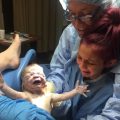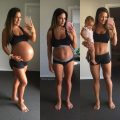During pregnancy, the body of a woman changes - thisfact. And after childbirth it changes again, and sometimes even more than in the previous nine months. Mom has to get used not only to her new status, but also to a new body. To some changes, it is completely unprepared. And what is most terrible, there are feelings that even a beloved husband can not complain about. Constipation, what torments many women during pregnancy, remains with them and after childbirth. Fortunately for a little while. Doctors say that the main cause of problems with the chair in young mothers is common fear. It is very scary that at the slightest effort the seams from an episiotomy or a cesarean will disperse. Yes, and just pushing - it seems that all the insides will fall out. But all this in a day or two will pass. But you can also help your body: use more fiber, eat bananas and drink plenty of water.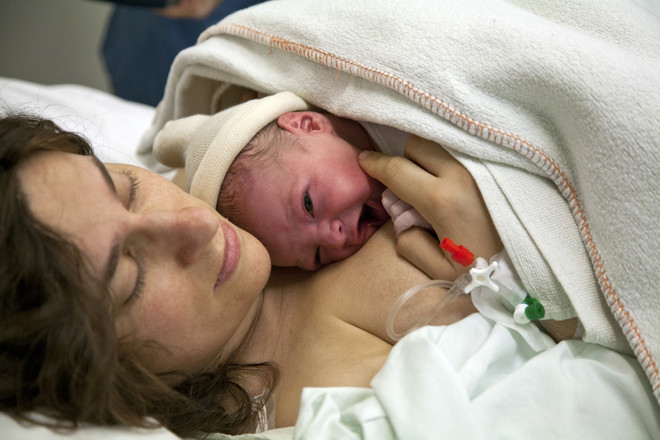 Photo: GettyImages2. Hair loss First you have excellent hair, nails, and breasts. Then all this in the reverse order you lose - after giving birth. The bust will return to the prenatal size last. But the nails and hair will be betrayed first. With hair, incidentally, in general a magical story: not only do they cease to shine and begin to fall out, so also they will cut through in places where you did not notice them. For example, on the chin. All this is associated with hormonal changes in your body. He should help a little: eat healthy and high-grade food, take vitamins, make hair masks (at least sometimes). And for hormones do not worry: they will soon return to normal and unwanted hair will leave you. Urinary incontinence Natural delivery can lead to a weakening of the pelvic floor muscles. In some cases, the muscles weaken so much that it becomes difficult to control the bladder. For the same reason, it happens that the urethra does not completely contract. An innocent sneeze can lead to an unpleasant embarrassment. But do not despair: the muscles return to normal several weeks after the birth. To speed up the process, you can do special exercises - Kegel complex. 4. Uncontrolled lactation All bras become catastrophically small - this is noticed by all mothers from the second half of pregnancy. The chest swells, colostrum begins to appear, which soon after the birth of the baby will turn into milk. At this stage, even those who could only boast of a solid "singular" become proud owners of a solid "troyka." Unfortunately, for a while: after a while the breast will inevitably hang, and then completely blown off. But with breastfeeding, in addition to the obvious advantages for the baby, there is also a bonus for the mother: it turns out that if the woman is breastfeeding, the uterus is reduced faster than those, who prefer the mixture. This is besides convenience and economy. What is most interesting, the milk of the mother is not allocated according to the schedule. His development is stimulated by tender feelings for the child. It is worthwhile for a young mother to just think about her baby, how she immediately feels a rush of milk.
Photo: GettyImages2. Hair loss First you have excellent hair, nails, and breasts. Then all this in the reverse order you lose - after giving birth. The bust will return to the prenatal size last. But the nails and hair will be betrayed first. With hair, incidentally, in general a magical story: not only do they cease to shine and begin to fall out, so also they will cut through in places where you did not notice them. For example, on the chin. All this is associated with hormonal changes in your body. He should help a little: eat healthy and high-grade food, take vitamins, make hair masks (at least sometimes). And for hormones do not worry: they will soon return to normal and unwanted hair will leave you. Urinary incontinence Natural delivery can lead to a weakening of the pelvic floor muscles. In some cases, the muscles weaken so much that it becomes difficult to control the bladder. For the same reason, it happens that the urethra does not completely contract. An innocent sneeze can lead to an unpleasant embarrassment. But do not despair: the muscles return to normal several weeks after the birth. To speed up the process, you can do special exercises - Kegel complex. 4. Uncontrolled lactation All bras become catastrophically small - this is noticed by all mothers from the second half of pregnancy. The chest swells, colostrum begins to appear, which soon after the birth of the baby will turn into milk. At this stage, even those who could only boast of a solid "singular" become proud owners of a solid "troyka." Unfortunately, for a while: after a while the breast will inevitably hang, and then completely blown off. But with breastfeeding, in addition to the obvious advantages for the baby, there is also a bonus for the mother: it turns out that if the woman is breastfeeding, the uterus is reduced faster than those, who prefer the mixture. This is besides convenience and economy. What is most interesting, the milk of the mother is not allocated according to the schedule. His development is stimulated by tender feelings for the child. It is worthwhile for a young mother to just think about her baby, how she immediately feels a rush of milk.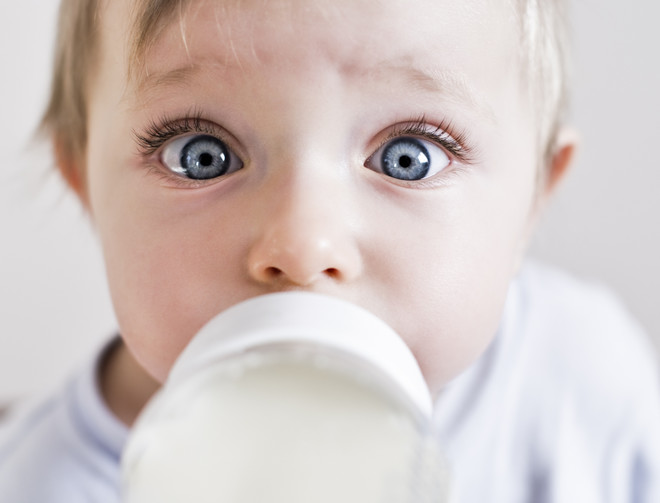 Photo: GettyImages5. Dryness and pain in the vaginaHow birth and the natural process, but still quite traumatic. When the child passes through the birth canal, they stretch, and sometimes burst. The next few weeks will have to endure lochia - postpartum uterine discharge. It's like a month, only worse. At least because it's longer: this period can take up to three months. And the abundance at first can shock. Another problem is the dryness of the vagina. By the way, breastfeeding mothers often face it. Symptom, to be sure, unpleasant. How to deal with it, it is better to ask your gynecologist. 6. Back pain The longer the gestation period, the greater the burden on the lower back muscles that have to support the growing abdomen. After the birth, although the stomach is already gone, the load does not go away - the abdominal muscles are still too weak, and the back has to be "for two". Gradually, these pains will come to naught, especially if you focus on strengthening the back and muscles of the press. But, unfortunately, another pain will come instead of them - the back will hurt already in another place due to the fact that you often wear a child for a long time. Pigmentation The blotch on the face is a phenomenon that poisons the lives of many women since the second trimester. Not too cute, to be sure, but perfectly normal. Sometimes the future mothers even have a so-called mask pregnant, in the medical language - melasma. These are symmetrical dark spots around the mouth, eyes and chin. In some cases, the skin becomes drier, acne often appears. All this also begins to go off after birth, do not worry. Medicamental treatment of pigmentation is rarely required.
Photo: GettyImages5. Dryness and pain in the vaginaHow birth and the natural process, but still quite traumatic. When the child passes through the birth canal, they stretch, and sometimes burst. The next few weeks will have to endure lochia - postpartum uterine discharge. It's like a month, only worse. At least because it's longer: this period can take up to three months. And the abundance at first can shock. Another problem is the dryness of the vagina. By the way, breastfeeding mothers often face it. Symptom, to be sure, unpleasant. How to deal with it, it is better to ask your gynecologist. 6. Back pain The longer the gestation period, the greater the burden on the lower back muscles that have to support the growing abdomen. After the birth, although the stomach is already gone, the load does not go away - the abdominal muscles are still too weak, and the back has to be "for two". Gradually, these pains will come to naught, especially if you focus on strengthening the back and muscles of the press. But, unfortunately, another pain will come instead of them - the back will hurt already in another place due to the fact that you often wear a child for a long time. Pigmentation The blotch on the face is a phenomenon that poisons the lives of many women since the second trimester. Not too cute, to be sure, but perfectly normal. Sometimes the future mothers even have a so-called mask pregnant, in the medical language - melasma. These are symmetrical dark spots around the mouth, eyes and chin. In some cases, the skin becomes drier, acne often appears. All this also begins to go off after birth, do not worry. Medicamental treatment of pigmentation is rarely required.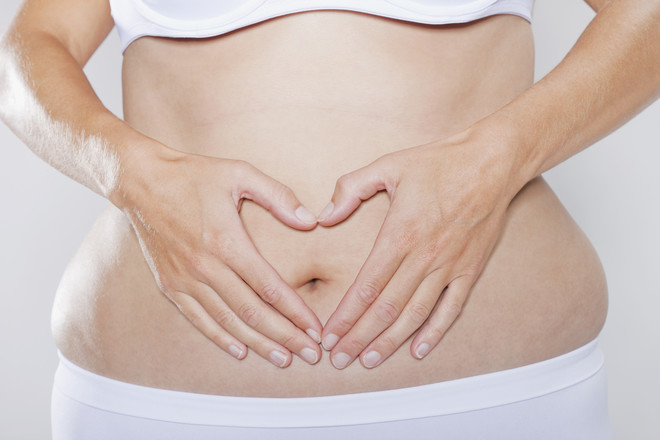 Photo: GettyImages8. A big belly For many young mothers, the shock is the fact that the belly does not go away after childbirth. At first it looks like you are still in the sixth month. The volume does not go away immediately, you have to wear a bandage until the uterus shrinks to normal size. Sometimes there is diastasis, when the muscles of the press diverge. In mild cases it turns out to strengthen them with the help of physical education, then the stomach comes back to normal. But with severe diastasis, you have to resort to the help of doctors who sew the divergent muscles. In addition, the stomach is "decorated" with a distinct dark line from the pubic to the navel, which appeared in the second trimester. It will disappear, do not worry. But the streamers will stay with you forever. They can be made slightly less noticeable with a laser. But is it worth it? Over time, stretch marks become white, and many mothers prefer not to notice them. And in the West, even a new fashion has appeared - to decorate stretches with colored tattoos to commemorate pregnancy. Sometimes it turns out even cute. 9. Growth of the foot "At me and so the fortieth, where much more," my girlfriend Natasha nearly cried. "And my mother says that the leg will inevitably grow." Indeed, during pregnancy, the size of the leg often increases. It's all about weight - it's growing, because of this the arch of the foot is flattened, and the foot itself becomes slightly longer and wider. The second reason is increased production of relaxin, growth hormone. Thanks to him, your muscles and ligaments become more flexible, and births are easier. The size of Natasha's leg, by the way, has not changed. Maybe because she gained only 6 kilograms for the whole pregnancy. Varicosis The blue pattern under the skin appears during pregnancy and due to hormonal changes, and because of the growing weight. It is important to take preventive measures: to sit less, especially leg to foot, walk more, lie down in the evenings, lift your legs higher, wear compression linen. And do not throw all these exercises after childbirth - then the veins that have appeared will hide back. Even during pregnancy, vascular spiders can appear on the ankles. They also often resolve after childbirth. But sometimes you need help phlebologist. By the way, treating varicose medicines is useless! If the doctor advises you a magic ointment or no less magic tablets, most likely, he is cunning.
Photo: GettyImages8. A big belly For many young mothers, the shock is the fact that the belly does not go away after childbirth. At first it looks like you are still in the sixth month. The volume does not go away immediately, you have to wear a bandage until the uterus shrinks to normal size. Sometimes there is diastasis, when the muscles of the press diverge. In mild cases it turns out to strengthen them with the help of physical education, then the stomach comes back to normal. But with severe diastasis, you have to resort to the help of doctors who sew the divergent muscles. In addition, the stomach is "decorated" with a distinct dark line from the pubic to the navel, which appeared in the second trimester. It will disappear, do not worry. But the streamers will stay with you forever. They can be made slightly less noticeable with a laser. But is it worth it? Over time, stretch marks become white, and many mothers prefer not to notice them. And in the West, even a new fashion has appeared - to decorate stretches with colored tattoos to commemorate pregnancy. Sometimes it turns out even cute. 9. Growth of the foot "At me and so the fortieth, where much more," my girlfriend Natasha nearly cried. "And my mother says that the leg will inevitably grow." Indeed, during pregnancy, the size of the leg often increases. It's all about weight - it's growing, because of this the arch of the foot is flattened, and the foot itself becomes slightly longer and wider. The second reason is increased production of relaxin, growth hormone. Thanks to him, your muscles and ligaments become more flexible, and births are easier. The size of Natasha's leg, by the way, has not changed. Maybe because she gained only 6 kilograms for the whole pregnancy. Varicosis The blue pattern under the skin appears during pregnancy and due to hormonal changes, and because of the growing weight. It is important to take preventive measures: to sit less, especially leg to foot, walk more, lie down in the evenings, lift your legs higher, wear compression linen. And do not throw all these exercises after childbirth - then the veins that have appeared will hide back. Even during pregnancy, vascular spiders can appear on the ankles. They also often resolve after childbirth. But sometimes you need help phlebologist. By the way, treating varicose medicines is useless! If the doctor advises you a magic ointment or no less magic tablets, most likely, he is cunning.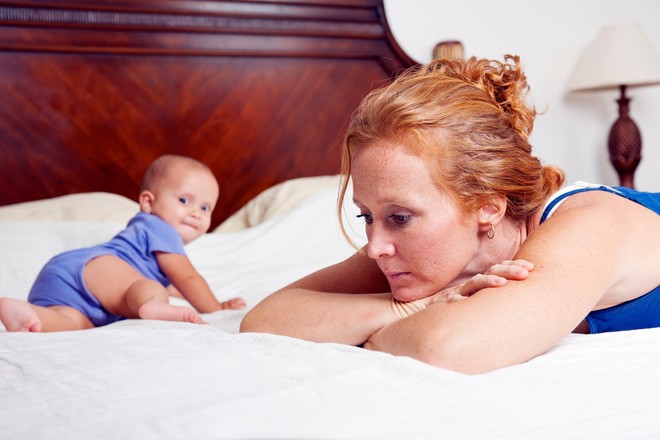 Photo: GettyImages11.Mood swingsHormones are raging, the baby is sleeping poorly, relatives and friends are pestering you with advice and demanding a viewing, and you would like to sleep and at least a little come to terms with your own changed body. It is not surprising that many people have mood swings: from tears of happiness to melancholy is one step. And yes, no one has canceled postpartum depression. This is not a myth or a whim. This is a condition that requires attention, and sometimes treatment. 12. Excess weightGetting back to your pre-pregnancy shape can sometimes be very, very difficult. Do not rush with this, because your body needs to recover. You do not need to give up on yourself either. Watch your diet: your nutrition should be complete and balanced. It is better to forget about tasty treats, except for empty calories and extra pounds, they do not bring anything. Yes, at first you will still be soft and flabby. And to hell with the supermodels who, two days after giving birth, look like they've never been pregnant. That's their job. 13. Sweating A pregnant body loves to store water. If you've ever suffered from edema, you know that. It's not that easy to get rid of this fluid. So know this: after giving birth, you'll sweat like never before. Some even wake up at night because they're literally lying in a puddle. This doesn't mean you need to limit your drinking. On the contrary, you need as much clean water as possible. This will help restore your fluid balance to normal. 14. Cellulite What we call cellulite is actually called lipodystrophy. This is when the fat under the skin bunches up into unpleasant lumps, and your thighs become flabby and lumpy. Weight fluctuations are to blame. During pregnancy, gaining extra pounds is inevitable - the body needs fat during pregnancy. In addition, it is accompanied by increased production of the hormone estrogen. Thanks to it, connective tissue becomes looser and the skin turns into an orange peel. Well, unhealthy diet and insufficient physical activity make the situation worse. 15. Flat butt How is it possible: you gained weight, but your butt got smaller? Yes, that's right. Even if you managed to fit into your favorite jeans, they won't fit you like before. This is because your posture changes in such a way that the pelvis shifts back, the gluteal muscles require less effort, and they immediately deflate. Only sports can help with this problem: running, walking, cycling, swimming.
Photo: GettyImages11.Mood swingsHormones are raging, the baby is sleeping poorly, relatives and friends are pestering you with advice and demanding a viewing, and you would like to sleep and at least a little come to terms with your own changed body. It is not surprising that many people have mood swings: from tears of happiness to melancholy is one step. And yes, no one has canceled postpartum depression. This is not a myth or a whim. This is a condition that requires attention, and sometimes treatment. 12. Excess weightGetting back to your pre-pregnancy shape can sometimes be very, very difficult. Do not rush with this, because your body needs to recover. You do not need to give up on yourself either. Watch your diet: your nutrition should be complete and balanced. It is better to forget about tasty treats, except for empty calories and extra pounds, they do not bring anything. Yes, at first you will still be soft and flabby. And to hell with the supermodels who, two days after giving birth, look like they've never been pregnant. That's their job. 13. Sweating A pregnant body loves to store water. If you've ever suffered from edema, you know that. It's not that easy to get rid of this fluid. So know this: after giving birth, you'll sweat like never before. Some even wake up at night because they're literally lying in a puddle. This doesn't mean you need to limit your drinking. On the contrary, you need as much clean water as possible. This will help restore your fluid balance to normal. 14. Cellulite What we call cellulite is actually called lipodystrophy. This is when the fat under the skin bunches up into unpleasant lumps, and your thighs become flabby and lumpy. Weight fluctuations are to blame. During pregnancy, gaining extra pounds is inevitable - the body needs fat during pregnancy. In addition, it is accompanied by increased production of the hormone estrogen. Thanks to it, connective tissue becomes looser and the skin turns into an orange peel. Well, unhealthy diet and insufficient physical activity make the situation worse. 15. Flat butt How is it possible: you gained weight, but your butt got smaller? Yes, that's right. Even if you managed to fit into your favorite jeans, they won't fit you like before. This is because your posture changes in such a way that the pelvis shifts back, the gluteal muscles require less effort, and they immediately deflate. Only sports can help with this problem: running, walking, cycling, swimming.

Making Money with Desserts: Success Stories
Evgeniya Polischuk (Fedutinova) instagram:@evgeniyafedutinovavk.com/janeshomebaking– It all started with baking for family and friends. Gradually, I started posting photos of my baked goods on Instagram – and orders started coming in. I made my first custom-made cake on October 13, 2014, and a little earlier I started making macaroons and cupcakes. You could say that the business “found me”, I am very […]

Soups are cold recipes with photos
Cold cucumber soup with yogurt and lemonsorbet from the chef of the restaurant La Taverna Alexander Zhurkin Photo: Getty Images Ingredients: Plain yoghurt – 125 g Cucumber – 150 g Lemon/lime sorbet – 50 g Cocktail shrimp – 24 g Fresh ginger juice – 1 g Lime juice – 5 g Fresh orange juice – 5 g Parsley – 1 g Pink pepper – 1 g Watercress – […]

barbeque kebab
Pork tenderloin in glaze Photo:Dmitry Bayrak/dbstudioPreparation time: 20 minutes + marinating time.Calories: 454 kcal per serving.For 4 servings: 4 pork tenderloins (approximately 300 g each), 1 onion, 2 cloves of garlic, 1 tsp. lemon zest, 1 tsp. lemon juice, a pinch of ground cumin, coriander and turmeric, 1 tbsp. vegetable […]

Pierre Duacan: dietary recipes: Ducane diet
Beetroot soup Photo:Season’S, Luxury Hotels RepresentationYou will need:· Boiled beetroot – 60 g· Fresh cucumbers – 20 g· Red radish – 20 g· Green onions – 10 g· Egg – 1 pc.· Drinking mineral water – 200 g· Salt – 1 gPreparation:· Boil the egg and beetroot.· Grate the cucumbers, radish and part of the beetroot. Put everything […]
